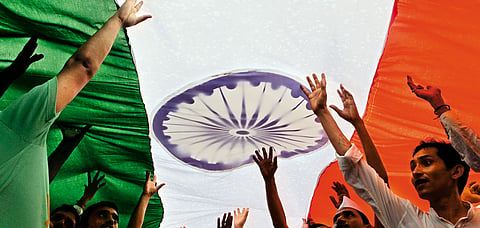
- Destinations
- Experiences
- Stay
- What's new
- Celebrating People
- Responsible Tourism
- CampaignsCampaigns
- SubscribeSubscribe
- Buy Now

He&rsquos an economist by day and a political aficionado by evening. Combine that with a love for travel, that too along ground-zero of India&rsquos electoral process, and you can never go wrong with your insights. Ruchir Sharma, who is a Managing Director with Morgan Stanley, has come out with his third book, Democracy on the Road. During his jaunts he attempted to gauge the mood of the general public and, of course, the politicians, especially when election fervour gripped the nation or any of the states. It&rsquos all there in the book, along with a glimpse into the undercurrents caste divide, dynasty politics, the influence of god-men (and women), and voting patterns. In a casual conversation with OT, the Jaipur-born and Bijnor-bred writer shares his favourite travel anecdotes.
To begin with, what brings an economist or investment banker to Indian politics
I was a writer long before I became an investment banker. I started writing for Economic Times when I was 17. Along the way, I made a lot of journalist friends. In 1998, I decided to put together a team of four or five fellow writers and travel the country to get to know the thought-process of the people. When we did our first trip, it was just the five of us. Over the years we have grown into a group of 25 members, with 20 travelling at any given point of time. We have had 27 such trips.
Could you elaborate on the term &lsquoLimousine Liberals&rsquo
That was not a term I coined. Back in those days, we never had SUVs during the election trials. I wanted all of us to sit together during our travels. So we decided to hire a six-door black Volvo used in weddings in those days. My dear friend, Shekhar Gupta, popularised the term by using it in a few articles. But now things have changed. A lot of them aren&rsquot liberal anymore, and the black Volvos have been replaced by Innovas.
What is your favourite travel memory from the past 25 years
There is something seductive about each of the trips we have taken. The most memorable one would be our trip to Bathiya, Bihar, in November 2005. We undertook a 16-hour train journey from Delhi in the Sampoorna Kranti Express. Our hotel then turned out to be a vertical dhaba the term &lsquorunning hot water&rsquo took a new meaning as the staff literally ran around with hot water, there was no electricity, we had to sit outside and eat our meals. It was quite an experience.
You say your visit to the Gorakhnath Math (Mutt) was quite strange. Why
When we reached Gorakhnath Math, everything was saffron. It was a strange, or one of the strangest, places we had seen. A fortified space paved with white marble surroundings, and a sparkling white temple in one of the dirtiest towns we had ever visited. There, in a saffron-coloured room with saffron-coloured curtains and matching sofas, we met Adityanath in his saffron robes with his guru disapproving of us from a portrait on a wall. Outside the room there stood a statue of Kali, otherwise seen only with a garland of skulls, but fully dressed here.
Can you recall a fond experience with a politician you met
Of all the politicians I have met, the most hospitable and welcoming of them is, without any doubt, Lalu Prasad Yadav. Every time we went there, we were welcomed with samosas (or singaras as they are popularly called) along with sweets and tea. I vividly remember that in the middle of one of our conversations he got up, walked over to his white horse, Chetak, petted him, and then came back to continue our talk. Since our first visit, our point of contact at Lalu&rsquos had standing instructions to keep samosas and tea ready whenever we visited.
I&rsquom curious to know about the three meals you were forced to have on one evening in Bihar...
It was 2010 and we had already been to Lalu&rsquos house where we had been served food. Our next meeting was with Nitish Kumar, his staunch rival back then. We could not tell Kumar that we had already had food at Lalu&rsquos, so we ate there too. Later, we had our customary dinner planned with Ravi Shankar Prasad. So we had singaras, cutlets, pakoras and litti chokhas&mdashall in the span of six hours. Our politicians are very hospitable.
What is the most bizarre thing you have seen a follower do for his/her favourite leader
The first thing that comes to mind is many followers setting themselves on fire when they heard their &lsquoamma&rsquo had died. There were people on the streets crying, some were offering prayers... the whole state mourned. Jayalalithaa was like a deity to her followers and was immensely respected among peers.
